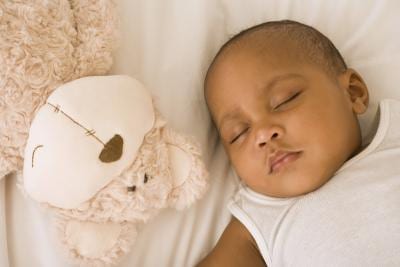Some children sleep soundly from the moment their heads hit the pillow until the sun peeks through their window the next day, but others’ nights are filled with the fitful waking associated with sleep disturbances. If your child seems unable to make it through a night without the occasional wake up, consider what factors may be leading him to lose out on sleep as well as what you can do to help.
Discomfort
While some sleep disruptions only impact a small number of children, nearly all children experience discomfort-induced wake-ups at some point. Wake-ups of this type start when your child is an infant and are the reason your baby can’t make it through the night. During infancy, children’s sleep patterns are shorter and they fluctuate in and out of deep sleep more rapidly. Because they spend more time in light sleep, they are more prone to waking up as a result of discomfort, such as hunger.
Nightmares
Nightmares are a common occurrence in children. This sleep disruption, which occurs most commonly prior to the child turning 6, can make a night of restful sleep anything but relaxing, reports AtHealth. Children who suffer from frequent nightmares may wake up several times a week, or even multiple times in one night, as a result of these disturbing dreams. In most children, nightmare frequency tapers off during childhood. If your child does not appear to get past this stage, speak with his pediatrician, as his nightmares could be the sign of something more serious.
Obstructive Sleep Apnea
Sleep apnea is a disorder in which individuals stop breathing for short periods of time during sleep. Generally, sleep apnea sufferers begin breathing again on their own, but, on occasion, the disorder results in death. Children are particularly prone to obstructive sleep apnea, reports the American Sleep Apnea Association. This sleep disruption impacts 1 to 3 percent of all preschool children, making their nights not so restful. Obstructive sleep apnea commonly occurs when the child’s breathing is impeded either by his position or by a nasal obstruction, such as inflamed adenoids. Because this condition not only disrupts your child’s sleep but also can be fatal, you should speak to your pediatrician.
Bed-Wetting
As children master control of their bladders, they commonly suffer through bouts of bed wetting. While this sleep disruption is most common in children under 3, 15 percent of all children will continue to struggle with bed-wetting past this age, reports the American Academy of Child and Adolescent Psychiatry. Children can struggle with bed-wetting for an assortment of reasons, ranging from the inability to control their bladders to sleep patterns that are so deep that the urge to urinate fails to wake the child. If your child continues to suffer from bed-wetting issues, speak to your pediatrician and develop a plan.
Insomnia
While it may seem uncommon, children suffer from insomnia just as adults do. An assortment of factors could lead your child to suffer through insomnia, reports the Cleveland Clinic. Causes might include caffeine in the child’s system, medication side effects, the presence of a pervasive sleep disorder or environmental factors. Because sleep is vital for the health and well-being of children, you should always mention bouts of insomnia to your child’s doctor, regardless of how infrequent they may be.





